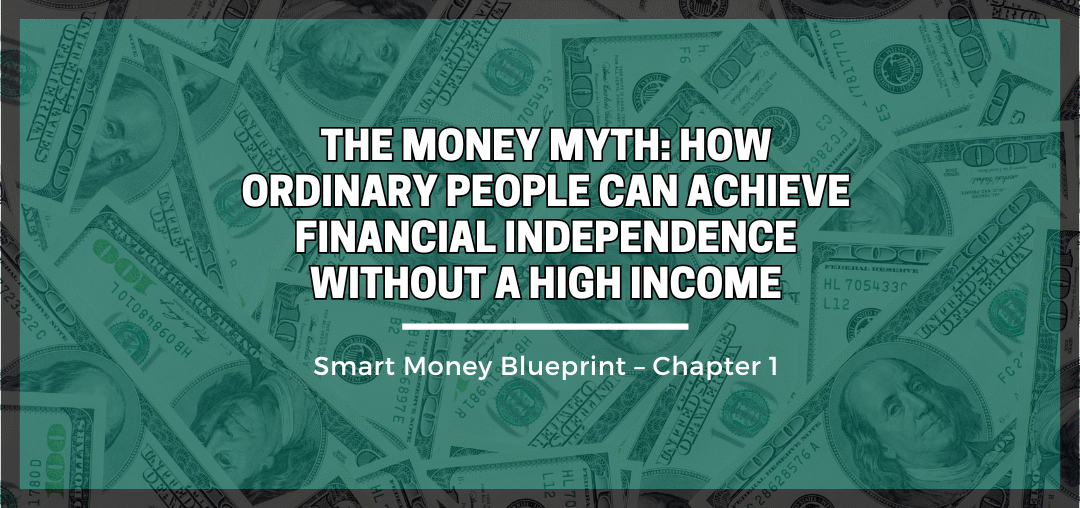Smart Money Blueprint – Chapter 1
Introduction
There is a persistent and deeply held misconception among many working individuals and families — the belief that wealth is only attainable by the elite. This myth suggests that financial independence is exclusively for those with high-paying careers, large inheritances, or extraordinary luck. Such thinking is not only false but harmful. It prevents people from making financial progress because they assume the opportunity to build wealth is beyond their reach.
The reality is far more empowering: anyone, regardless of income level, can take meaningful steps toward financial security and long-term wealth. This chapter explores and dismantles the most common misconceptions about money and outlines the foundational mindset needed to begin building a secure financial future.
Myth #1: “I Don’t Earn Enough to Save or Invest”
This is one of the most frequently cited reasons people avoid saving or investing. However, it does not reflect financial reality.
Consider the example of an individual earning a modest income who consistently sets aside a small portion of their paycheck. Suppose they invest $150 per month over a 40-year career at an average annual return of 9%. With discipline and consistency, this person could amass over $1 million by retirement — without ever earning a high income or receiving an inheritance.
By contrast, someone earning a six-figure salary who spends indiscriminately and saves little may face financial insecurity despite their high earnings.
Key Insight: Wealth is not determined by how much you earn — but by how much you keep, how consistently you save, and how you allow your money to grow over time.
Myth #2: “I’ll Save Once I Start Making More Money”
It is natural to assume that higher income will make saving easier. However, research and real-life behavior often contradict this assumption. Individuals who postpone saving in anticipation of future income increases often find their expenses grow in tandem with their earnings — a phenomenon known as “lifestyle inflation.”
Waiting for the “right time” can lead to years of lost opportunity, especially when factoring in the power of compound interest. Building the habit of saving while earning a modest income is not only possible — it is essential.
Key Insight: The discipline to save matters more than the size of the paycheck. Start with what you can afford now, and increase your savings as your income grows.
Myth #3: “Investing Is Too Risky — I’d Rather Keep My Money Safe”
This belief stems from a misunderstanding of what constitutes risk. While investing in the stock market involves volatility, keeping your money in low-yield savings accounts exposes it to a more insidious risk: inflation.
For example, if your savings account yields 1% interest annually, but inflation rises by 3%, your money is losing purchasing power every year. Over time, this “safe” strategy guarantees a decline in real value.
Investing wisely — in diversified funds or retirement accounts — can provide significantly better long-term returns. Historically, well-managed equity investments have outperformed cash holdings and savings accounts, especially over periods of 10 years or more.
Key Insight: Avoiding investment may feel safe, but it virtually guarantees underperformance. Educated investing offers a path to true financial growth.
Myth #4: “I’m Just Not Good With Money”
Many individuals believe that financial success requires an innate skill or a background in finance. In reality, personal finance is a learned discipline. The fundamentals of budgeting, saving, and investing are accessible to anyone willing to learn.
Unfortunately, most school systems do not teach financial literacy, leaving many adults unprepared to make informed financial decisions. However, this lack of early education is not a permanent barrier. Today, there is an abundance of accessible resources — including this guide — designed to empower individuals with practical financial knowledge.
Key Insight: No one is born understanding money. With the right education and mindset, anyone can develop strong financial habits.
The Foundation of Wealth: Common Sense Over Complexity
While financial products and systems may seem complex, the principles behind financial security are surprisingly simple. True wealth is built on:
- Living below your means
- Saving consistently
- Managing debt wisely
- Investing over the long term
- Understanding how inflation, taxes, and interest impact your finances
- Protecting your income and assets with appropriate insurance
These principles do not require luck, genius, or perfect timing. They require awareness, discipline, and a plan.
You Are Already Making Financial Decisions — Make Them Intentionally
Every day, whether consciously or not, you make decisions that affect your financial future — from choosing how to spend a dollar to deciding whether to invest, borrow, or save. The question is not whether you are participating in the financial system, but whether you are doing so with a clear understanding and a defined strategy.
Without knowledge, many people fall into traps such as credit card debt, underinsurance, and missed investment opportunities. By learning how money truly works, you gain the ability to make decisions that benefit you — not banks, lenders, or marketers.
Action Plan: Laying the Foundation for Your Financial Journey
Start your journey toward financial independence with the following practical steps:
1. Begin Tracking Your Spending
Use a spreadsheet or a mobile budgeting app to monitor where your money goes each month. Awareness is the first step toward change.
2. Set Up an Automatic Savings Transfer
Choose an amount — even $25 per week — and have it automatically transferred to a separate savings or investment account. The habit is more important than the initial amount.
3. Learn One New Financial Concept Each Week
Commit to reading each chapter of this Smart Money Blueprint series. Each section is designed to build your confidence and competence.
4. Schedule a Free Financial Strategy Session
Our licensed professionals offer no-obligation consultations to help you assess your current situation and create a simple, effective plan.
📞Click Here to Download the full ebook
Final Thoughts
Financial independence is not reserved for the wealthy — it is available to those who understand the principles of how money works and apply them consistently.
You’ve already taken the most important step: choosing to learn. The journey continues with action, and we are here to support you every step of the way.
Would you like me to begin the next chapter — “Pay Yourself First: The First Law of Wealth” — in this same formal tone?
Enjoyed this post?
💬 We’d love to hear your thoughts in the comments below!
🎯 Ready to turn your passion into profits?
👉 Enroll in our FREE Affiliate Marketing Course and start building your online income today — no experience needed!







